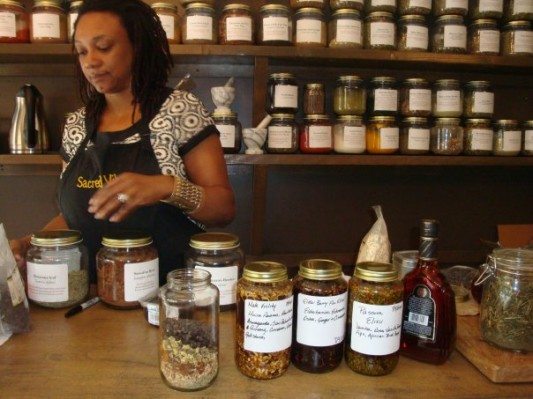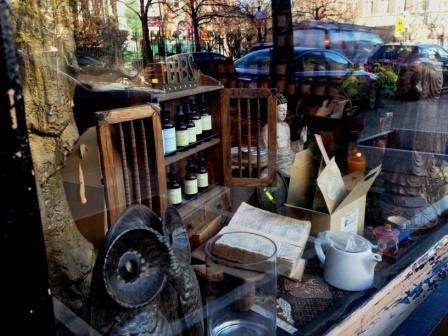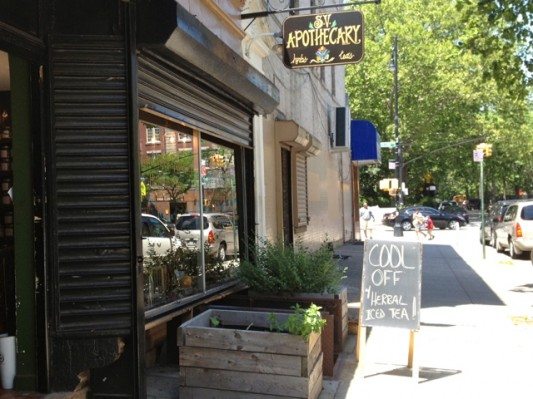Herbs, Health, and More at Sacred Vibes Apothecary

Karen Rose is a healer. A master herbalist and owner of Sacred Vibes on Argyle Road, she grew up amidst healers in Guyana and Ditmas Park. She embraced her calling after becoming a mother. She said:
I wanted to give my kids the experience I had when I was a child around healing. So, I formally studied herbalism. Today my practice is inclusive of my study and the spirit of what it means to be a healer, gained in childhood. I continue to return home to study indigenous healing practiced to strengthen my work.
Karen opened Sacred Vibes because, as a consultant, she recommended herbs to her clients. Sadly, there was nowhere to buy herbs in bulk. Sacred Vibes was her answer to that need.

There are many spokes to Sacred Vibes. One can simply buy the teas, tinctures, potions, and lotions on the shelf. Ask, like I often do, for products that will sooth a specific ailment. Karen has a line specifically for eczema that I highly recommend.
One unique line designed by Karen is Divine Daughters, launched two years ago specifically for pre- and post-natal health, including “education on herbs for fertility, pregnancy, labor and delivery, postpartum, and beyond.” Particularly exciting is that several Divine Daughters users are now proud mothers. Karen said, “It’s great!”
Additionally, Karen offers master herbalist consultations. “As a child,” she explained, “most of my healing came at the hands of these various healers, who used different healing modalities to maintain or improve my health.” She will explore traditional herbal remedies with you during your consultation.
Should you have a desire to become a master herbalist yourself, you can enroll as an apprentice. The apprenticeship lasts two to three years, depending the apprentice’s dedication. Apprentices need to have “a desire to learn about the application of plant medicine and the study of spirituality.” Beyond that, apprentices come from all backgrounds. Their commonality is the desire to heal.
Graduates of the program may operate as herbalists or may incorporate herbalism into their current occupation and lifestyle.

What does it mean to be a master herbalist, anyhow?
“The term master herbalist traditional means someone who does not only practice clinically but also does formulary and has mastered the vast forms and applications of herbal medicine,” Karen explained.
Being an herbalist influences everything in Karen’s life, including seemingly small decisions like what to eat, which are really larger decisions that affect the planet. On a personal level, being a master herbalist informs “the way in which I treat others and the impact of my actions on this planet. The mother, sister, daughter, and friend I am,” she said.
I asked Karen to share with us something we could use as the seasons change, a time sicknesses flare:
We are approaching spring, and our bodies are adjusting to warmer temperatures and releasing stores we might have held for the winter, therefore herbs that are releasing, cleansing, and balancing are great for this time of the year. Some of the ones that first poke through the ground are best, like dandelion, nettles, burdock, violet, wild mustard greens, chives, etc.
The great thing is “they can be used in foods or in medicine,” she said.
For more herbal tips and what teas to drink through the spring, visit Karen at Sacred Vibes at 376 Argyle Road, off Cortelyou, Monday-Friday 12-7pm, Saturday 11am-7pm, Sunday 11am-5pm, or online.
Top picture via Sacred Vibes.




